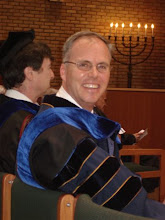I wrote this piece to respond to an article in Touchstone Magazine implying that Open Theism is a heresy.
I write to respond S.M. Hutchens recent article "Paradox Lost: The Easy Road to Heresy." He claims that Open Theology is a heresy which rejects the classical appreciation of the paradox by which God can have absolute knowledge of the future and yet permit free actions. He does so on the basis of Christology and Patristic thought. The overall argument seems to be that classical theologians rejoice in embracing certain paradoxes concerning God.
Open Theists are unwilling to embrace paradox due to excessive rationalism.
I believe open theism it is a fully orthodox option. To claim that God chooses to limit his knowledge of some future events to provide for genuine libertarian free-will does not necessarily contract the doctrine of divine omniscience. God knows all he chooses to know. The limitation is not imposed on God due to his finitude but self-imposed due to love. Open Theists base divine sovereignty not in God's absolute knowledge and control of every orbiting atom but in God's self-giving love as revealed on the cross.
A helpful distinction can be made between paradox (something that seems false but proves to be true) and contradiction (something that seems false because it cannot be true by nature). Open Theistis simply claim that free-will and absolute foreknowledge are non-compatible affirmations. This is simply a common-sense observation and not dangerous commitment to rationalism as Hutchens implies. Free-will arises from God's self-limitation
of some future events. It poses no fundamental challenge to God's
omniscience and omnipotence other than to say God is not able to do that which is fundamentally illogical. This goes against God's own nature.
God not only knows all he chooses to know about free future actions, God knows all the possibilities and probabilities. But sometimes free actions, as the scriptures clearly teach, surprise God himself, and he moderates his own responses accordingly to achieve his plan. God has millions of avenues to achieve his will on earth free-will notwithstanding. To affirm this only enhances God's sovereignty and glory.
A Bible professor of mine once made the comment while we were reading one of the many 'God regretted' kinds of passages that when the Bible says something repeatedly, eventually we do well to stop arguing and simply acquiesce. "Good theology is able to survive a reading of the Bible" he said. The church should never stop responding to scripture to articulate its vision of God. Patristic thought may have imbibed too deeply of the wells of Plotinus. It is time to allow scripture to speak for itself.
Joel Allen
Assistant Professor of Religion
Lambuth University
Jackson, TN
Wednesday, August 5, 2009
Subscribe to:
Post Comments (Atom)

Well said! Thanks for making a rational, yet simple, summary that challenges the hyberbole. This "heresy" talk coming from the contradictarian side is getting tiresome.
ReplyDeleteleodvinci